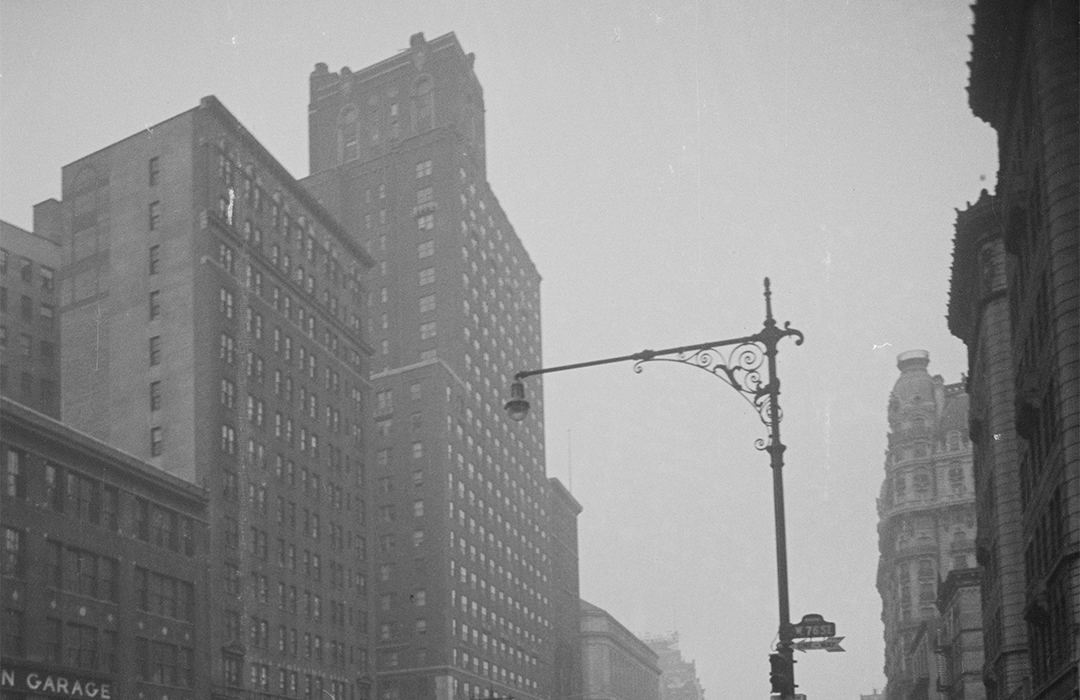
The Beacon Hotel
by Tom Miller
In 1925 the Chanin Construction Company, which already had erected several theater buildings, joined forces with Samuel L. Rothafel to build a masterpiece, the Roxy Theatre. Designed by Walter W. Alshager, it was deemed the “Cathedral of the Motion Picture.” Even before it opened, the Chanin Construction Company and Rothafel laid plans to design a combination theater-hotel at the southeast corner of Broadway and 76th Street, stretching to Amsterdam Avenue. Walter W. Alshager was brought back to design the goliath structure.
For some reason, the Havemeyer Construction Company, headed by J. Henry Small, took over the project, purchasing the site from the Chanin Construction Company. Completed in 1928, the 24-story building was designed in a scaled-back take on the Italian Renaissance style. Clinging to its sparsely decorated façade were occasional pseudo-balconies and other tepid nods to Italian design. J. Henry Small originally intended the hotel to be named the Midway, and the theater (the Roxy Corporation had put down a $250,000 deposit on the lease) was to be the Midway Theatre. That all changed when Small conceived the idea of installing an airway beacon—powerful vertical-shining lights to direct airplanes—on the roof. The hotel’s name was changed to the Midway Beacon Hotel, and then simply the Beacon. The theater followed suit, becoming the Beacon Theatre.
Financial troubles soon came for both venues. The hotel opened on July 12, 1928, but five months later, on December 18, The New York Times reported that the Havemeyer Construction Company had gone bankrupt with an outstanding mortgage of $5.25 million on the property (an astounding $83 million in 2022). The Chanin Construction Company purchased the theater-hotel in April 1930, rescuing it from financial disaster.
“the Havemeyer Construction Company had gone bankrupt with an outstanding mortgage of $5.25 million on the property”
The theater had also undergone near catastrophic financial problems. Construction costs had gone $2.5 million over budget, forcing the Roxy Corporation to cease work. The uncompleted venue temporarily sat vacant until Warner Brothers came to the rescue, purchasing the lease in 1929 and finishing its construction. The sumptuous palace opened on Christmas Eve 1929 with a talking picture, Tiger Rose starring Lupe Valez.
The Beacon was a residential hotel, most of its upper-middle-class tenants being long-term. Among the early residents was Lila D. Ernst, whom The New York Sun said, “has been known among her friends as a successful woman stock broker.” Lila Ernst’s luxurious lifestyle, however, was not the result of her successes in trading stocks. She was a scam artist.
She and her partner, broker George W. Hoblitzell, worked from an office at 91 Wall Street. They aggressively marketed stocks in two corporations, the American Guaranty & Trading Corporation and the A. B. C. Trading Corporation. Had their clients looked closely at the certificates, they would have seen that both corporations had a mailing address of 91 Wall Street. In fact, Hoblitzell and Ernst were the sole employees, he the president and she the director of both firms.
On October 9, 1930, The New York Sun reported that “after hunting for Mrs. Ernst for several days,” New York State Troopers branded her a fugitive. The article said, “She is alleged to have disappeared about the same time that George W. Hoblitzell, also a broker, left his residence.” It does not appear that she was ever apprehended.
At mid-century the Beacon Hotel had somewhat declined, occasionally cited in divorce cases as the spot for extra-marital trysts. By the last quarter of the 20th century, many of the residents were elderly. The financial straits of the management came to light in August 1975 when the Consolidated Edison Company threatened to cut off the electricity. The management had accumulated unpaid bills of $82,000.
On August 16, The New York Times journalist Maurice Carroll reported that Congresswoman Bella Abzug’s office was working on the problem. Her representative Mannie Mirabel said, “The tenants, 400 elderly persons, had called for help.” The owner of the hotel had attempted to get a restraining order against Con Ed to no avail. Now, Mirabel said, “We talked to Con Ed and told them we were kind of upset.” The intervention prevented the elderly residents from losing power.
Among them was Dora Weissman, a veteran actress of the Yiddish theater, Broadway, motion pictures, and television. She was the widow of Yiddish playwright and theater manager Anshel Schorr. She had made her Broadway debut in 1937 in Hitch Your Wagon, and had appeared in several plays and movies. But American audiences knew her best as Mrs. Herman in the radio and television show The Goldbergs and on the Milton Berle Show. She had formerly conducted the Dora Weissman School of Performing Arts.
In the autumn of 1978 residents complained of “unusual odors” around the area of Dolores Novel’s apartment. City officials from the Health Department inspected her room in September. Their report listed “one live turkey, two ducks, approximately 17 cats and maybe more, one rabbit, four live turtles in a bathtub, and one animal resembling a dog or fox.” The inspectors continued, “The floor of the room was littered with droppings, food and materials. A stench was present throughout.” After Doris Novel was served eviction papers, she appealed in Housing Court. The process garnered her seven more months in her room. But she lost the appeal on April 5, 1979, and, according to Newsday, she “must leave the Beacon Hotel and take her pets with her.”
Their report listed “one live turkey, two ducks, approximately 17 cats and maybe more, one rabbit, four live turtles in a bathtub, and one animal resembling a dog or fox.”
In June 1985 China Club opened in the basement. Two years later Lisa W. Foderaro wrote in The New York Times, “Many clubs take off like Roman candles only to sputter in popularity with each passing month. But China Club, a record-industry gathering place on the Upper West Side, is more popular now than when it opened…The owners have David Bowie, Julian Lennon and Stevie Wonder to thank for that.” Owner Danny Fried explained, “Word got out in the music industry that this was a living room where these guys could play if they wanted or not play.”
Despite its success, or because of it, the nightspot was anything but popular with the neighbors. Complaints about noise and disorderly conduct forced China Club to move out in June 1997. It was replaced by Ivy Club, “a nightclub featuring a dance floor and several theme rooms,” according to The New York Times on December 20, 1998. The venue proved no more peaceful for the neighbors than China Club had been.
On March 20, 2002, The New York Times reported that two weeks earlier the club had closed. A local, Stuart Levine, told reporter Kelly Crow that he and his neighbors had battled for four years “trying to quiet, and eventually shut down, the club.” He said, “It took longer than most murder cases. But last weekend, everyone around here got their first good night’s sleep in years.”
In 2008 the Beacon Hotel was refurbished, each room now having a kitchenette. No longer considered sketchy, it was described by the National Geographic Traveler in 2015: “Generously sized rooms, great location, and family friendly are the buzz words for this hotel. Ideal for concertgoers with tickets to the legendary art deco Beacon Theater.” The following year the Beacon Theater, too, received a make-over. The interior was carefully restored by the architectural firm of Beyer Blinder Belle. More than 1,000 workers were involved in the project.
Tom Miller is a social historian and blogger at daytoninmanhattan.blogspot.com
Building Database
Keep Exploring
Be a part of history!
Think Local First to support the local businesses at 2124-2136 Broadway:


